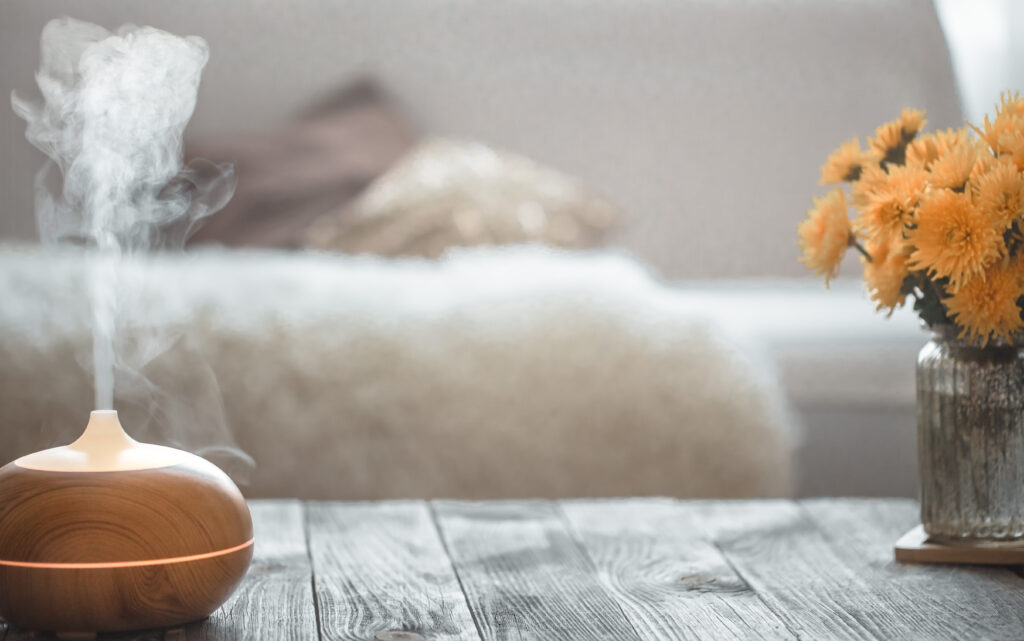Aroma diffusers have become increasingly popular in homes and workplaces, touted for their ability to improve mood, reduce stress, and even enhance physical health. But are these benefits real, or just hype? In this blog, we explore whether aroma diffusers are truly good for your health.
What is an Aroma Diffuser?

An aroma diffuser is a electric device few products come with candles that disperses essential oils into the air. These oils, derived from plants, have been used for centuries in various cultures for their therapeutic properties.
There are several types of aroma diffusers, each working in a slightly different way to release these beneficial compounds into the environment:
Ultrasonic Diffusers: These use water and ultrasonic waves to create a fine mist of essential oils, which is then dispersed into the air. They double as humidifiers, adding moisture to the air.
Nebulizing Diffusers: These do not use water or heat. Instead, they use pressurized air to create a fine mist of essential oils, providing a potent aroma.
Heat Diffusers: These use heat to evaporate essential oils into the air. While they are typically less expensive, the heat can alter the chemical composition of the oils.
Evaporative Diffusers: These use a fan to blow air through a pad or filter containing essential oils, causing the oils to evaporate more quickly into the air.
Health Benefits of Aroma Diffusers

Stress Reduction and Relaxation:
Essential oils like chamomile and lavender are naturally designed for their calming effects. Several studies have demonstrated that these oils can reduce stress levels and promote a sense of relaxation. The act of inhaling these scents can stimulate the limbic system in the brain, which is responsible for emotions and memories, helping to ease anxiety and stress.
Improved Sleep Quality: Essential oils such as lavender and bergamot are also known to improve sleep quality. They promote relaxation and help in establishing a conducive environment for sleep. Research has shown that these oils can improve sleep patterns and reduce symptoms of insomnia.
Enhanced Mood and Mental Clarity: Citrus oils like lemon and orange are known for their mood-lifting properties. These oils can help alleviate symptoms of depression and anxiety, providing an uplifting effect on the mood. They can also enhance mental clarity and alertness, making them useful for boosting productivity and concentration.
Respiratory Health: Oils such as eucalyptus and peppermint have been found to aid respiratory health. They can help clear nasal passages, making it easier to breathe, especially during colds or allergies. Their decongestant properties can be particularly beneficial for individuals with respiratory issues.
Antimicrobial Properties: Some essential oils possess antimicrobial properties that can help purify the air. Oils like tea tree and eucalyptus can reduce the presence of airborne bacteria and viruses, potentially lowering the spread of illnesses.
Risks and Precautions

While aroma diffusers offer numerous benefits, it’s essential to be aware of potential risks and take necessary precautions:
Allergic Reactions: Some individuals may experience allergic reactions to certain essential oils. Symptoms can include skin irritation, headaches, or respiratory issues. It’s crucial to test a small amount of the oil before extensive use.
Quality of Essential Aroma Oils: Always use top-quality, pure essential oils. Synthetic oils or oils with additives can cause adverse reactions and may not provide the same health benefits.
Sensitive Populations: Pregnant women, infants, and pets may be more sensitive to certain essential oils. Consult with a healthcare provider before using an aroma diffuser in environments where these sensitive populations are present.
Usage Guidelines: Follow the manufacturer’s guidelines for usage, including the amount of oil to use and the duration of diffusion. Overuse can lead to adverse effects, such as headaches or nausea.
Conclusion

Aroma diffusers can be a great addition to your wellness routine, offering numerous health benefits from stress reduction to improved respiratory health. However, it’s crucial to use them responsibly and be aware of potential risks.
With the right precautions, you can safely enjoy the soothing and therapeutic effects of essential oils.
By incorporating an aroma diffuser into your daily life, you can create a more relaxing, healthful, and pleasant environment, enhancing both your mental and physical well-being.
An aroma diffuser is a device that disperses essential oils into the air, creating a pleasant and therapeutic atmosphere. It works by breaking down the essential oils into tiny molecules, which are then dispersed into the air as a fine mist. Depending on the type of diffuser—ultrasonic, nebulizing, evaporative, or heat—it uses different methods to disperse the oils effectively.
Yes, aroma diffusers can be beneficial for your health. They can help improve air quality, reduce stress, enhance mood, and promote relaxation. Essential oils like lavender and chamomile are known for their calming properties, while eucalyptus and peppermint can help clear respiratory pathways. However, it’s important to use high-quality essential oils and follow proper usage guidelines to avoid any adverse effects.
Yes, many people find that using aroma diffusers can help reduce stress and anxiety. Essential oils like lavender, bergamot, and ylang-ylang are known for their relaxing and mood-enhancing properties. When diffused, these oils can create a calming environment, which may help lower stress levels and promote a sense of well-being.
Aroma diffusers can aid in relieving certain respiratory issues. Essential oils like eucalyptus, tea tree, and peppermint have decongestant properties that can help clear nasal passages and improve breathing. However, it’s crucial to ensure proper ventilation and consult with a healthcare provider, especially for individuals with asthma or other chronic respiratory conditions.
While aroma diffusers are generally safe, there are some potential risks to be aware of. Overuse of certain essential oils can cause headaches, dizziness, or allergic reactions. It’s also important to keep diffusers out of reach of children and pets, as some essential oils can be toxic to them. Always follow the manufacturer’s instructions and use essential oils in recommended amounts.
It’s best to use an aroma diffuser in moderation. For most people, diffusing essential oils for about 30 minutes to an hour at a time, a few times a day, is sufficient to enjoy the benefits without overwhelming the senses. Adjust the frequency and duration based on personal preference and the specific oils being used.
Not all essential
oils are suitable for diffusing. Always use pure, high-quality essential oils
that are specifically labeled for aromatherapy use. Avoid synthetic fragrances
and oils that are not intended for inhalation. Research each essential oil before
use to ensure it’s safe and appropriate for your needs.
Regular cleaning and maintenance are crucial to ensure your diffuser works efficiently and safely. Most diffusers can be cleaned by wiping out the water reservoir with a soft cloth and using a mixture of water and white vinegar to remove any residual oils. Refer to the manufacturer’s instructions for specific cleaning guidelines and frequency recommendations.